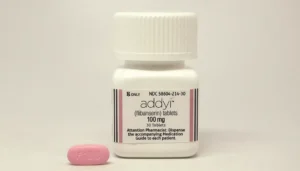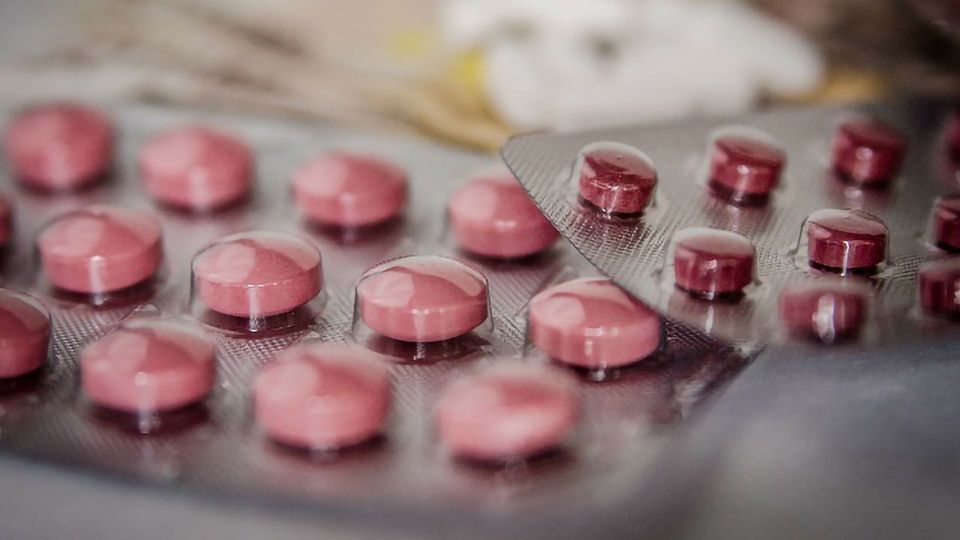In recent years, the conversation about women’s sexual health, especially during and after menopause, has gained more attention. Among the many developments in this field, Addyi (flibanserin) has emerged as a significant option for postmenopausal women. This medication initially approved for premenopausal women with hypoactive sexual desire disorder (HSDD), is now increasingly being considered for postmenopausal women as well. In this blog, we will delve into how Addyi for postmenopausal works, and its potential benefits and considerations for postmenopausal women.
Contents
How Does Addyi For Postmenopausal Work?
 Addyi (flibanserin) works by affecting the balance of certain chemicals in the brain that are linked to sexual desire. Its mechanism is especially relevant for postmenopausal women, who often experience changes in sexual desire due to hormonal and other physiological shifts. Here’s a breakdown of how Addyi works in the context of postmenopausal women:
Addyi (flibanserin) works by affecting the balance of certain chemicals in the brain that are linked to sexual desire. Its mechanism is especially relevant for postmenopausal women, who often experience changes in sexual desire due to hormonal and other physiological shifts. Here’s a breakdown of how Addyi works in the context of postmenopausal women:
- Neurotransmitter Modulation
Addyi primarily acts on three neurotransmitters in the brain: dopamine, norepinephrine, and serotonin. These chemicals play a crucial role in sexual desire and arousal.
- Dopamine and Norepinephrine Levels
Addyi increases the levels of dopamine and norepinephrine, neurotransmitters associated with sexual excitement and arousal. By boosting these levels, Addyi can help enhance sexual desire.
- Serotonin Levels
At the same time, Addyi decreases the levels of serotonin, which is another neurotransmitter that can suppress sexual desire if present in high amounts. This reduction in serotonin can further help in boosting sexual interest.
- Addressing Hormonal Changes
Postmenopause, women experience a significant drop in estrogen and progesterone levels, which can affect mood, energy levels, and sexual interest. While Addyi doesn’t directly influence hormone levels, by modifying neurotransmitter activity, it can help mitigate some of the sexual desire issues that may arise due to these hormonal changes.
It’s crucial for women considering Addyi to consult with their healthcare provider to ensure it’s appropriate for their specific situation, especially considering potential side effects and interactions with other medications. Addyi represents an important option in the broader context of managing sexual health in postmenopausal women, offering a pathway to address changes in sexual desire in a non-hormonal manner.
Does Addyi Increase Estrogen?
No, Addyi (flibanserin) does not increase estrogen levels. Addyi works through a different mechanism that is distinct from hormonal pathways. It primarily functions by modifying the balance of certain neurotransmitters in the brain, specifically dopamine, norepinephrine, and serotonin. These are associated with sexual desire and arousal.
Unlike hormone replacement therapy, which directly affects hormone levels (such as estrogen and progesterone) to alleviate menopausal symptoms, Addyi operates by influencing the brain’s chemical messengers. This makes it a non-hormonal option for treating hypoactive sexual desire disorder (HSDD) in premenopausal and postmenopausal women.
Because Addyi does not interact with estrogen or other hormones directly, it can be a suitable treatment option for women who cannot or choose not to use hormone-based therapies due to contraindications, side effects, or personal preference.
What Are The Benefits Of Addyi For Postmenopausal?
 Addyi (flibanserin), used for treating hypoactive sexual desire disorder (HSDD) in women, offers several potential benefits for postmenopausal women. These benefits address the specific needs and changes that occur during this phase of life:
Addyi (flibanserin), used for treating hypoactive sexual desire disorder (HSDD) in women, offers several potential benefits for postmenopausal women. These benefits address the specific needs and changes that occur during this phase of life:
- Improved Sexual Desire: The primary benefit of Addyi is the enhancement of sexual desire. For postmenopausal women experiencing a decrease in libido. It is a common issue due to hormonal and physiological changes, Addyi can help restore sexual interest.
- Non-Hormonal Treatment: Postmenopausal women often seek alternatives to hormone replacement therapy due to its associated risks and side effects. Addyi provides a non-hormonal option for managing sexual health. This can be particularly beneficial for those who have contraindications for hormone therapy.
- Psychological and Emotional Benefits: Improved sexual desire and activity can have positive effects on a woman’s psychological and emotional well-being. It can boost confidence, improve mood, and enhance overall quality of life.
- Positive Impact on Relationships: Sexual health is an integral part of many romantic relationships. By addressing issues related to low sexual desire, Addyi can help improve relationship satisfaction and intimacy for postmenopausal women and their partners.
- Long-Term Solution: Addyi is designed for long-term use, providing a sustained approach to managing HSDD. This continuity can be reassuring for women seeking a stable solution to their sexual health concerns.
- Increased Awareness of Women’s Sexual Health: The availability and use of Addyi bring more attention to the importance of women’s sexual health, especially during and after menopause. This can encourage more open discussions between women and their healthcare providers about sexual health issues.
- Tailored to Individual Needs: Addyi offers an additional option for women who have not found success with other treatments for low sexual desire. This can be particularly important in the nuanced field of sexual health, where individual experiences and responses to treatment can vary widely.
It’s important to note that while Addyi can be beneficial, it is not suitable for everyone and can have side effects. Women should consult with their healthcare provider to discuss the potential benefits and risks of Addyi in their specific case.
What Are The Side Effects And Considerations?
Addyi for postmenopause can have side effects and requires careful consideration before use. Here are some of the key side effects and considerations associated with Addyi:
Side Effects
- Dizziness and Nausea: These are among the most common side effects. They can be particularly concerning for older women who may be at higher risk of falls and injuries.
- Fatigue and Sleepiness: Addyi can cause significant drowsiness, which can impact daily activities and overall energy levels. This is why it’s recommended to take it at bedtime.
- Low Blood Pressure: Addyi can cause hypotension, particularly when combined with alcohol or certain medications.
- Fainting: There’s an increased risk of syncope (fainting), especially if taken with alcohol, certain prescription medications, or over-the-counter herbal supplements.
- Insomnia: Some women may experience trouble sleeping.
Considerations
- Alcohol Interaction: It’s strongly advised to avoid alcohol while taking Addyi, as the combination can increase the risk of severe low blood pressure and fainting.
- Medication Interactions: Addyi can interact with a wide range of medications, including certain antidepressants, antifungals, and medications for HIV or hepatitis C. It’s crucial to review all medications and supplements with a healthcare provider before starting Addyi.
- Liver Function: Addyi is not recommended for people with liver impairment.
- Not for Postmenopausal Hormonal Issues: Addyi doesn’t address other postmenopausal symptoms like vaginal dryness or hot flashes, as it is not a hormone therapy.
- Effectiveness: The effectiveness of Addyi can vary. Some women may experience significant improvements, while others might find the benefits less pronounced.
- Long-term Commitment: Addyi needs to be taken daily and may take several weeks to show effects. It’s not a quick-fix solution and requires a commitment to ongoing use.
- Pregnancy and Breastfeeding: The safety of Addyi during pregnancy and breastfeeding is not well established. Women in these categories should consult with their healthcare provider.
- Mental Health Impact: While Addyi can improve sexual desire, it’s not a treatment for mood disorders or other mental health conditions.
- Cost and Insurance Coverage: Addyi can be expensive, and insurance coverage for it varies. It’s important to consider the cost and insurance coverage when deciding whether to use this medication.
Women considering Addyi should have a detailed discussion with their healthcare provider about these potential side effects and considerations. This conversation should include a review of their overall health, other medications they are taking, and lifestyle factors to determine if Addyi is a suitable and safe option for them.
What Is The Alternative To Addyi?
 For women seeking alternatives to Addyi, several options are available. These alternatives range from other medications to lifestyle changes and psychological therapies. Here are some common alternatives to Addyi:
For women seeking alternatives to Addyi, several options are available. These alternatives range from other medications to lifestyle changes and psychological therapies. Here are some common alternatives to Addyi:
- Bremelanotide (Vyleesi)
This is another FDA-approved medication for the treatment of HSDD in premenopausal women. It’s an injectable medication used before sexual activity, unlike Addyi, which is taken daily.
- Hormone Therapy
For some postmenopausal women, hormone replacement therapy (HRT) can help manage symptoms related to menopause, including issues with sexual desire. This may involve estrogen or a combination of estrogen and progesterone.
- Lifestyle Modifications
Factors like stress, lack of sleep, and physical health can impact sexual desire. Addressing these through lifestyle changes such as regular exercise, a balanced diet, adequate sleep, stress management, and quitting smoking can be beneficial.
- Counseling and Sex Therapy
Psychological factors often play a significant role in sexual desire. Counseling or sex therapy, particularly when it focuses on relationship issues or psychological barriers to sexual satisfaction, can be effective.
- Natural Supplements
Some women explore natural supplements like ginseng, maca, or Tribulus terrestris. However, the efficacy and safety of these supplements can vary, and they are not FDA-regulated for treating HSDD.
- Mindfulness and Meditation
Practices like mindfulness and meditation can reduce stress and improve overall well-being, potentially having a positive effect on sexual desire.
- Pelvic Floor Physical Therapy
This can help if sexual discomfort or dysfunction is contributing to low desire.
- Vaginal Estrogens
For postmenopausal women, vaginal estrogens can be used to relieve vaginal dryness, making sex more comfortable and thereby potentially improving sexual desire.
It’s important to note that the effectiveness and appropriateness of these alternatives can vary greatly from person to person. Women considering any treatment for HSDD should do so under the guidance of a healthcare provider.
Conclusion
In conclusion, Addyi for postmenopausal offers a promising option for grappling with hypoactive sexual desire disorder (HSDD), providing a non-hormonal solution to enhance sexual desire. While it brings several benefits, including improved libido and emotional well-being, it’s important to be aware of its potential side effects. Alternatives such as Bremelanotide (Vyleesi), hormone therapy, lifestyle changes, and psychological counseling are also available and may be more suitable for some women.
Ultimately, the choice of treatment should be made after a thorough discussion with a healthcare provider, considering the individual’s specific health needs and lifestyle. If you are facing menopause-related issues, menopause treatment at HerMantra can help. Book your free trial online menopause treatment session now.


